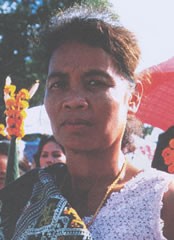Nyahkur in Thailand

Photo Source:
Copyrighted © 2026
Peoples of the Buddhist World, Asia Harvest All rights reserved. Used with permission |
Send Joshua Project a map of this people group.
|
| People Name: | Nyahkur |
| Country: | Thailand |
| 10/40 Window: | Yes |
| Population: | 1,600 |
| World Population: | 1,600 |
| Primary Language: | Nyahkur |
| Primary Religion: | Buddhism |
| Christian Adherents: | 0.00 % |
| Evangelicals: | 0.00 % |
| Scripture: | Portions |
| Ministry Resources: | No |
| Jesus Film: | No |
| Audio Recordings: | Yes |
| People Cluster: | Mon-Khmer |
| Affinity Bloc: | Southeast Asian Peoples |
| Progress Level: |
|
Introduction / History
The self-name of this tribe is Nyahkur, which means "people of the forest." The Thais call them Chaobon, meaning "people of the hills." The Nyahkur consider this latter term derogatory.
Despite their small numbers, the Nyahkur are considered a historically important group. Many linguists believe that their language is a link between Mon and Khmer. One scholar says, "Their language contains so many Khmer and Mon words that some linguists consider the language as a bridge—even more closely related to ancient Mon than to the modern Mon dialect."
The Nyahkur people comprise one of Thailand's least known tribes. They inhabit valleys surrounded by lush hills in the three central Thailand provinces of Chaiyaphum, Nakhon Ratchasima and Phetchabun. The majority of Nyahkur are in Chaiyaphum. Most live in mixed villages with Isan and Thai people.
What Are Their Lives Like?
The Nyahkur people have been described as "addicted to borrowing." This has caused them to be trapped in poverty and a never-ending cycle of financial woe. As early as 1919, an anthropologist called the Nyahkur a "disappearing society" due to rampant disease, alcohol addiction and other destructive vices.
There is a bride price for Nyahkur weddings based on the woman's beauty, her abilities as a worker and the wealth of her parents.
What Are Their Beliefs?
In the past the Nyahkur were animists enslaved to powerful demons. In recent decades, due to the influence of their Thai and Isan neighbors, they have embraced Buddhism. Practically all Nyahkur now claim to be Buddhists. In reality, however, they have retained most of their former animistic practices and placed a veneer of Buddhism over them. The Nyahkur believe in various spirits: village guardian spirits, mountain spirits and soil spirits. They call these spirits nthock. They blame evil spirits for almost everything that goes wrong. They believe that if they wear a necklace made of flat pieces of copper to protect them against nthock lakthep, the most powerful evil spirit. The Nyahkur wear charms and amulets, such as Buddhist images, necklaces of beads and old silver coins.
What Are Their Needs?
Despite more than 40 years of missionary effort, there are no known Nyahkur Christians today. A team of missionaries first moved into the village of Ban Wang Ai Pho in 1982, and they have worked there since. One source says, "They were not successful in baptizing the Chaobon [Nyahkur] people, because of the superstitious and animistic nature of their beliefs. But they were very successful in studying and preserving Chaobon culture and they gave a helping hand in social, health, administrative, and human matters."
Prayer Points
Pray for the spiritual blindness and bondage to the evil one to be removed so they can understand and respond to Christ.
Pray God will have mercy on the Nyahkur, doing whatever it takes to place them in a position to receive him.
Ask God to open the hearts of the Nyahkur to the gospel.
Pray for an unstoppable movement to Christ among them.